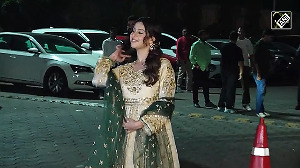The powerful IAS lobby dislikes him because, simply out, he is not one of them. Dr Singh held several posts in the Government of India between 1971 and 1991, including secretary, ministry of finance (department of economic affairs), Governor of the Reserve Bank, and Deputy Chairman of the Planning Commission. These were plum posts and many in the IAS resented an 'outsider' getting them.
The IAS lobby is particularly good at running down Dr Singh's credentials. Truth be told, they have a point in saying that he does not deserve to be called the 'architect of economic reform.'
By 1991, when Dr Singh became the finance minister, India was bankrupt as a result of stupid economic policies. (As noted, Dr Singh held several important posts; is there any record of a sustained campaign by him to advocate pulling down the licence-permit-quota Raj?) The country's foreign exchange reserves had drained away, leaving barely enough for a few weeks -- less than two months' worth -- of essential imports.
There was no way out but to appeal to the international lending agencies, and the IMF and the World Bank insisted on a dose of liberalisation as a condition. It was the IMF and the World Bank that were the true architects of reform -- but it suited everyone, including the Indian media, to uphold the myth that an Indian had initiated liberalisation without any prompting.
The Congress has imbibed some of the traits of the bureaucracy during its long years in power, including respect for 'seniority'. Jumping the queue is a cardinal sin -- unless of course the queue-jumper belongs to the Nehru-Gandhi clan.
There are several Congressmen who think of themselves as 'senior' to the prime minister by virtue of having entered politics earlier. One pointed out to me that Pranab Mukherjee was Dr Singh's boss back when the former was Indira Gandhi's finance minister and that his signature might well appear on the papers confirming Dr Singh's tenure in the Reserve Bank.
K Natwar Singh, Dr Singh's first external affairs minister before becoming a casualty of the oil-for-food scam, was reputedly one of those 'senior' Congressmen who could never quite stomach a 'junior' becoming the prime minister.
All this talk of 'senior' and 'junior' sounds pretty silly to outsiders, but it is genuinely felt by several Congressmen, and it is thus a factor in politics. Does anyone doubt that Dr Singh would still be prime minister if it were not for Sonia Gandhi and Rahul Gandhi? It is their will, not a popular mandate, that empowers Dr Singh.
There are, however, limits to the support offered by the Nehru-Gandhi family, and they have become only too evident in the ongoing Budget session of Parliament.
The DMK and the Trinamool Congress are the senior allies in the current incarnation of the UPA by virtue of numbers. They were also quick off the block to denounce all talk of privatisation or even divestment when such measures were hinted at in the President's Address. (Despite the name the speech is prepared by the Cabinet; the President merely reads it out.)
Sonia Gandhi decided to side with DMK chief M Karunanidhi and Trinamool leader Mamata Banerjee -- and the result was painfully evident when Pranab Mukherjee delivered the Union Budget.
Economic reform was put on the back-burner judging by the finance minister's speech, and the stock markets were duly spooked.
One must, however, appreciate why the DMK and Trinamool Congress loom larger in the Nehru-Gandhis's eyes than does Dr Singh. The two parties are a major factor in as many as 82 Lok Sabha seats (the Trinamool Congress in West Bengal, the DMK in Tamil Nadu and Pondicherry). It helps the Congress even if those two parties win only half of those 82 seats. (They won more than that in 2009.)
Mamata Banerjee understands the rules of the game as well as anyone else, and knows she can have a free hand in the railway ministry. (As a former Congress member she might even share the feeling that she is the prime minister's political 'senior', having been elected to the Lok Sabha as far back as 1984.) Her Railway Budget was only too clearly tailored to the West Bengal assembly polls due in 2011 rather than to the prime minister's economic agenda.
Mamata Banerjee announced over a dozen new trains for West Bengal, a takeover of the sick Burns Standard and Braithwaite wagon factory, rolling stock production and wagon rehabilitation facilities in Majerhat and Naopara, an EMU/MEMU and Metro coach factory in the Kanchrapara-Halisahar Railway Complex, and an apprentice training facility in Dankuni. She has taken 60 per cent off the ticket price for students using the Kolkata Metro, proposed seven new works to improve services in Kolkata, announced the creation of a 1,000 MW captive power plant near Maoist-hit Lalgarh, and promised to set up schools and hospitals. There is more, but you get the picture.
The prime minister might have preferred to concentrate on less glamorous freight trains and so forth, but he has no control over his Trinamool Congress colleague. I doubt that he can even persuade the formidable railway minister to spend a little more time in Delhi's Rail Bhavan rather than in the Eastern Railway headquarters in Kolkata.
Pranab Mukherjee's Union Budget was, whatever else you might say about it, a pan-Indian document, but Mamata Banerjee's Railway Budget was crafted with both eyes on West Bengal. And that is the way it is going to be until she leaves to become chief minister of West Bengal I suppose!
The prime minister's hopes of leaving a legacy have nothing to fear from the wounded BJP and the Left Front. But will his own colleagues permit him to carry out even half of what he wants?




